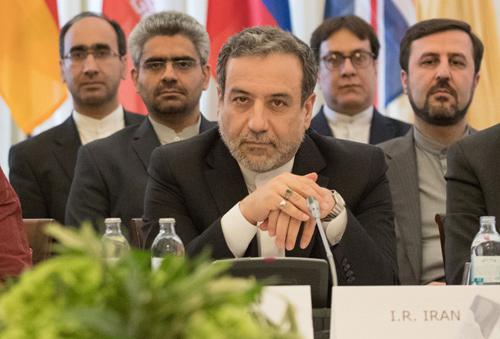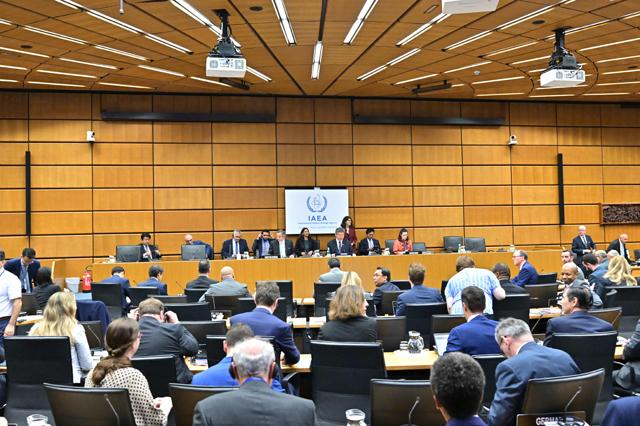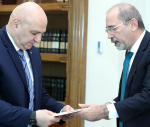You are here
Tensions over Iran nuclear accord: What are the stakes?
By AFP - Jul 01,2019 - Last updated at Jul 01,2019

Abbas Araghchi, political deputy at the ministry of foreign affairs of Iran looks on during a meeting of the Joint Commission of the Joint Comprehensive Plan of Action attended by the E3+2 (China, France, Germany, Russia, United Kingdom) and Iran at the Palais Coburg in Vienna, Austria, on Friday (AFP photo)
TEHRAN — Nearly four years after it was agreed, the 2015 Iran nuclear deal appears to be under serious threat.
How did we reach this point?
The Joint Comprehensive Plan of Action was concluded on July 14, 2015 in Vienna between Iran and the P5+1 (the five permanent members of the UN Security Council — China, Britain, France, Russia and the US — plus Germany).
It sought to bring to an end 12 years of international crisis surrounding a potentially nuclear-armed Iran.
Under the terms of the deal, Iran committed never to acquire the atomic bomb and to accept drastic limits on its nuclear programme in exchange for a partial lifting of international sanctions that had been strangling its economy.
Iran also submitted to unprecedented inspections by the International Atomic Energy Agency (IAEA).
But US President Donald Trump's unilateral withdrawal from the deal on May 8, 2018 — and subsequent sanctions — have deprived Iran of the economic benefits it expected and plunged it into recession.
Exactly a year after the US withdrew, Tehran announced it no longer felt beholden to two Vienna commitments.
It gave the remaining parties 60 days to help it bypass US sanctions, or it would withdraw from two further commitments.
What commitments has Iran renounced?
On May 8, President Hassan Rouhani said that Iran would temporarily cease to limit its stocks of heavy water and low-enriched uranium to 130 tonnes and 300 kilogrammes respectively.
Tehran has not yet breached these Vienna ceilings, but it does appear to be flirting with the uranium limit.
An Iranian official said on Friday that the national stock had hit 297.2 kilogrammes.
What are the other threats?
Iran has threatened to start enriching uranium above the agreed maximum purification level of 3.67 per cent from July 7.
Weapons-grade levels are about 90 per cent.
It has also threatened to resume building from that date a heavy water reactor — capable of one day producing plutonium — in Arak in central Iran, a project that had been mothballed under the deal.
What does Iran want?
The threats are "above all a call for help by Iran to its partners — to escape the growing difficulties which American sanctions have heaped on the economy", Francois Nicoullaud, a former French ambassador to Iran, told AFP.
For Clement Therme, a researcher on Iran at the International Institute for Strategic Studies, Tehran seeks "primarily to preserve" the Vienna deal itself.
"The main problem for Iran is to avoid economic collapse... without provoking a war."
But a military conflict "is a real probability due to the effects of Washington's strategy", Therme told AFP.
Is there a danger of proliferation?
"As long as Iran does not get close to a threshold of a tonne of lightly enriched uranium, there is no pressing concern,” Nicoullaud said.
But if Iran "amassed, for example, a stock of 200 to 300 kilogrammes of uranium enriched to nearly 20 per cent, there would be cause for great concern".
But even under that scenario, Nicoullaud noted, Iran could still not be deemed to be within months of being able to detonate a nuclear device.
And a growing stock of heavy water "presents no danger of proliferation, at least for many years", he said.
The retired diplomat also pointed out that Iran has not indicated it will expel IAEA inspectors, so "the evolution of the [nuclear] programme can still be observed".
For Therme, a relaunch of the programme would be "above all dangerous for Iran's population because it would drive the country into total isolation and even greater impoverishment of the people".
What are the risks beyond July 7?
If the remaining co-signatories are unable to ease the impact of US sanctions by July 7, "it is probable that Iran will follow through on its threats", Nicoullaud warned.
"But Iran's partners, and particularly the Europeans, would have no interest in immediately sanctioning" the Islamic republic, because this would immediately harden the situation, he observed.
Therme believes that the remaining signatories want "to avoid a war while giving respite to Iran's economy".
"The perception of an imminent risk of an American war... could drive the Europeans, the Chinese and the Russians to provide guarantees to the Islamic republic" on economic matters.
Therme said the UAE, Qatar and Oman also favour de-escalation, which could further feed into a multilateral diplomatic effort based on common economic and security interests.
Related Articles
VIENNA — Major European countries and the United States are expected to seek to censure Iran as the UN atomic watchdog started meeting on Mo
VIENNA — The IAEA said in a report on Tuesday that its monitoring tasks in Iran had been “seriously undermined” after Tehran suspended some
TEHRAN — Iranian President Hassan Rouhani said on Thursday that his country's "daily enrichment" of uranium was currently "higher" than befo















